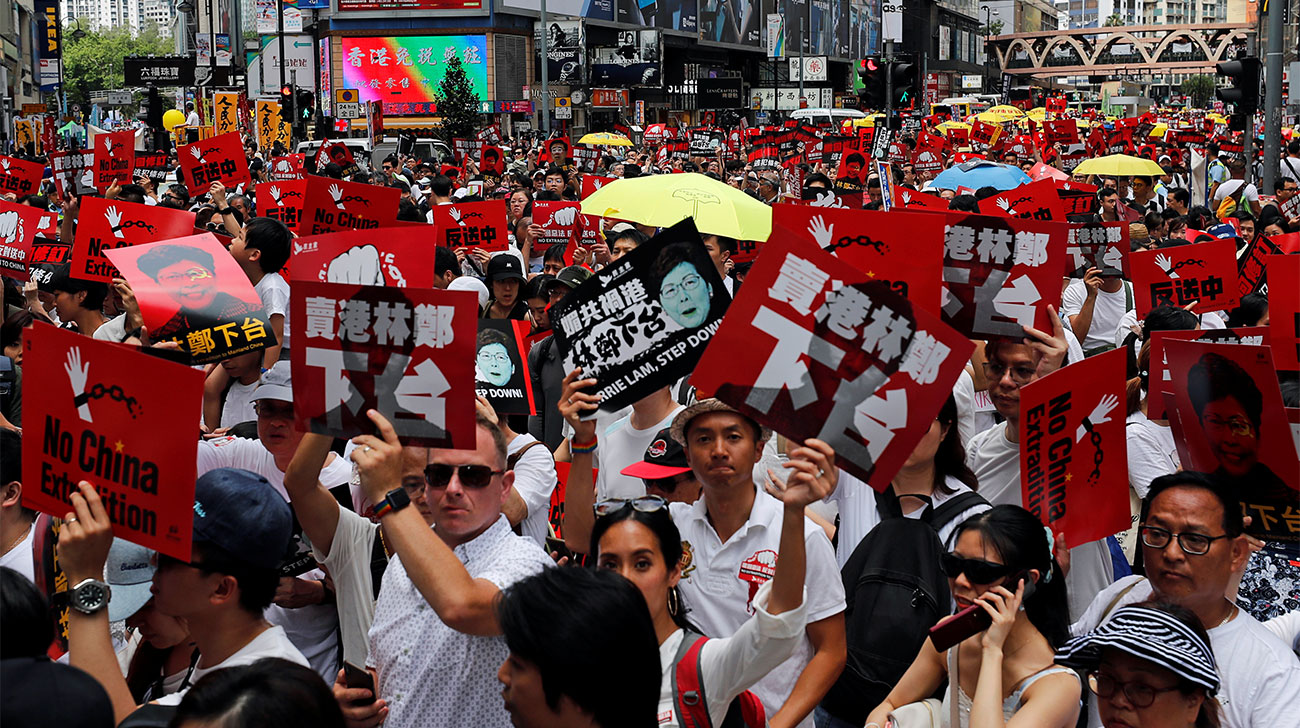Protesters scuffle with Hong Kong police

Scuffles broke out between protesters and police in Hong Kong today as hundreds of people remained on the streets to protest a planned extradition law with mainland China, a day after police fired tear gas and rubber bullets at demonstrators.
- Security tight in Hong Kong<br> - Legislative meeting adjourned on Thursday<br> - Protesters ready to step up demonstrations<br> - Government offices to close for the rest of week<br> - Some bank services suspended, staff work from
Protester numbers around the city's legislature, the epicentre of the violence, swelled today to thousands at one stage, with some protesters rushing to stop police from removing supplies of face masks and food.
Uniformed police with helmets and shields blocked overhead walkways in Hong Kong's financial district, while a long row of police vans was parked nearby.
Plainclothes police officers checked commuters' identity papers as a massive clean up was underway, clearing streets of debris, like broken umbrellas used by protesters to protect themselves and broken baricades, left from the violent clashes.
Protesters, some still wearing face masks and goggles in case police again use tear gas, were joined by school children during the day, but their numbers eased off later to a few hundred, after a Legislative Council meeting to discuss the extradition bill was postponed.
"We will be back when, and if, it comes back for discussion again," said protester Stephen Chan, a 20-year old university student. "We just want to preserve our energy now."
The extradition bill, which will cover Hong Kong residents and foreign and Chinese nationals living or travelling through the city, has sparked concerns it may threaten the rule of law that underpins Hong Kong's international financial status.
The legislature remained closed, with the council issuing a notice that the meeting to discuss the bill would not be held today.
Authorities have shut government offices in the financial district for the rest of the week after some of the worst violence in Hong Kong since Britain handed it back to Chinese rule in 1997.
On Wednesday, police fired rubber bullets, tear gas and pepper spray in a series of skirmishes to clear demonstrators from the legislature, with officials saying 72 people had been admitted to hospital by 10:00 pm.
It was the third night of violence since a protest on Sunday drew what organisers said was more than a million people in the biggest street demonstration since the 1997 handover.
Several thousand demonstrators stayed until the early hours of morning near the legislature in the Admiralty district, while thousands more retreated to the Central business district, overlooked by the towers of some of Asia's biggest firms and hotel chains, including HSBC and AIA.
Hong Kong's benchmark stock exchange slid as much as 1.5% on Thursday, extending losses from the previous day.
Most roads around the business district were opening for traffic, but Pacific Place, a prime shopping mall next to the legislature, stayed shut.
Banks, including Standard Chartered, Bank of China and DBS, said they had suspended branch services in the area.
Banks in the Central district emphasised it was 'business as usual' but many offered staff the option of working from home.
"As a precaution, we shut two outlets early where the protests were taking place. Our priorities are the safety of our employees and supporting our customers," said HSBC, whose ground-level public space at its headquarters has previously been a focal point for protests.
Hong Kong's China-backed Chief Executive Carrie Lam condemned the violence late on Wednesday and urged a swift restoration of order.
While acknowledging the controversy, Lam has refused to postpone or withdraw the bill, which she and her officials say is necessary to plug "loopholes" that allow the city to be a haven for criminals wanted on the mainland.
Lam has said the courts would provide human rights safeguards in vetting case-by-case extraditions to mainland China.
Opponents, including leading lawyers and rights groups, say China's justice system is marked by torture and forced confessions, arbitrary detention and poor access to lawyers.
In an impromptu media standup in the legislature, democratic lawmakers strongly criticised Lam's heavy-handed police response.
"We are not a haven for criminals, but we have become a haven of violent police. Firing at our children? None of the former chief executives dared to do that," said legislator Fernando Cheung.



 For all latest news, follow The Daily Star's Google News channel.
For all latest news, follow The Daily Star's Google News channel. 
Comments